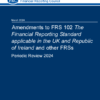
by John McCarthy Consulting Ltd. | Jul 3, 2019 | Blog, News
The Criminal Justice (Money Laundering and Terrorist Financing) Acts, 2010 to 2018 requires, among other things that:
- Each firm to appoint a person responsible for reporting to the authorities, known in the legislation as, the ‘designated person’ or otherwise better known as the ‘Money Laundering Reporting Officer’ (MLRO), a term not mentioned in the law;
- Each firm to have written AML Policies Controls & Procedures (PCP’s) that are updated regularly in line with changes in legislation, professional accountancy guidelines, persuasive guidance from external regulatory agencies like the Department of Justice and Finance and the Central Bank and the firm’s own unique experience in reporting AML incidents;
- Designated persons apply Customer Due Diligence (CDD) procedures to their clients in specific circumstances, which not only require the initial verification of client identity but also requires the ongoing monitoring of the business relationship with clients for suspicions of money laundering and terrorist financing;
Our new fully updated AML Policies & Procedures Manual fully deals with these requirements and is now available here.
It is fully updated for the Criminal Justice (Money Laundering and Terrorist Financing) Acts, 2010 to 2018 which came into force on 26 November 2018. It retails at €150+VAT.
See also our on-demand webinars on AML, accessible at any time.
Other webinar topics include Investment Property Accounting, FRS 105, Common Errors in FRS 102 Accounting and the latest on FRS 105 and company law, visit our online webinar training website. Once viewing is completed, customers will receive a CPD Certificate confirming their learning.

by John McCarthy Consulting Ltd. | Jun 27, 2019 | Blog, News
Some significant changes made in late 2018 to Irish AML legislation may have gone unnoticed. They need urgent attention as each designated entity is required, under Section 30A, to prepare a Business Risk Assessment. More on this in a subsequent blog.
The main changes introduced by the Criminal Justice (Money Laundering and Terrorist Financing) (Amendment) Act, 2018 are:
- Each designated entity is to carry out and document a Business Risk Assessment of the business/firm itself;
- Identify locally based Politically Exposed Persons (PEPs) and treat them (as well as defined family members) as high risk;
- Enhance the existing requirements for carrying out customer due diligence and require the maintenance of more detailed training records;
- For those businesses that deal in goods sold for cash, the threshold when AML identification of the customer is required, now starts at €10,000 (rather than €15,000 heretofore);
- The creation of the central register of beneficial owners in each EU country. In Ireland, this will be kept at the CRO. This register will be formally launched later in 2019. Watch for updates on the new launch date at https://rbo.gov.ie/.
Accountancy firms will need a set of procedures and checklists to deal with the new law. Our new fully updated AML Policies & Procedures Manual is now available here. It is fully updated for the Criminal Justice (Money Laundering and Terrorist Financing) Acts, 2010 to 2018 which came into force on 26 November 2018. It retails at €150+VAT.
For on-demand webinars on AML and developments in Investment Property Accounting, FRS 105, Common Errors in FRS 102 Accounting and the latest on FRS 105 and company law, visit our online webinar training website. Once viewing is completed, customers will receive a CPD Certificate confirming their learning.

by John McCarthy Consulting Ltd. | Jun 5, 2019 | Blog, News
In a recently issued audit report, the Irish Red Cross were criticised by their auditors over several matters including:
- how the charity manages restricted funds;
- how over €120,000 was deducted from four humanitarian appeal funds, as an administration charge without proper back-up to justify this;
- not all travel and subsistence claims were backed up by receipts; and
- for the lack of a proper purchase order system for spending money drawn down from overseas project funds.
For more on best practice in the Audit of Charities, see our up to date webinar here.
Also watch out for our new fully updated AML Policies & Procedures Manual coming later in June 2019 – includes the latest requirements of the Criminal Justice (Money Laundering and Terrorist Financing) Acts, 2010 to 2018 which came into force on 26 November 2018.
For on-demand webinars on AML and developments in Investment Property Accounting, FRS 105, Common Errors in FRS 102 Accounting and the latest on FRS 105 and company law, visit our online webinar training website. Once viewing is completed customers will receive a CPD Certificate confirming their learning.








